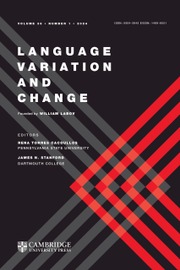Article contents
Second language acquisition and “real” French: An investigation of subject doubling in the French of Montreal Anglophones
Published online by Cambridge University Press: 25 November 2003
Abstract
We investigated the French of the first generation of Montreal Anglophones who had had access to French immersion schooling. Our aim was to determine the extent to which these Anglophones had acquired the variable grammar of their Francophone peers and how that was related to the type of French instruction received and to the types of exposure to French. In Montreal French, a subject NP may be “echoed” by a pronoun without emphatic or contrastive effect. Because this is not a feature of standard French, Anglophones who learned French primarily in school were not expected to exhibit it. On the other hand, Anglophones who frequently spent time with Montreal Francophones were expected to have picked it up. To test this hypothesis, we used a database of speech from 29 speakers, varying in their quantity and type of exposure to French. Multivariate analyses determined the degree of correlation of several linguistic and social factors (related to type and quantity of exposure to French) to the presence of a doubled subject. These data were then compared with that for L1 French. Speakers who were more nativelike with respect to the rate of subject doubling and effects of linguistic factors were those who had had more contact with native speakers, especially as adults.We thank Pierrette Thibault and Gillian Sankoff for graciously allowing us to use this corpus. The interviews in French, which provide the linguistic data and some sociological data, were conducted by Hélène Blondeau, Marie-Odile Fonollosa, Lucie Gagnon, and Gillian Sankoff. The follow-up interviews in English, which provide additional sociological data, were conducted by Naomi Nagy. The authors gratefully acknowledge the interviewers' work, the helpful comments of two anonymous reviewers, and the support of a Summer Research Fellowship from the University of New Hampshire to the first author in 1997.
- Type
- Research Article
- Information
- Copyright
- © 2003 Cambridge University Press
References
REFERENCES
- 25
- Cited by


